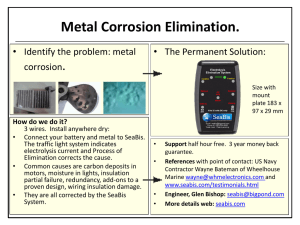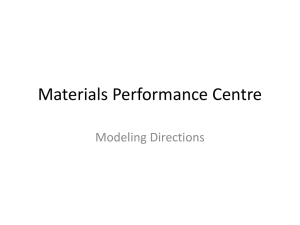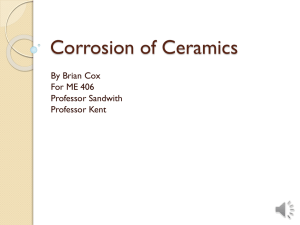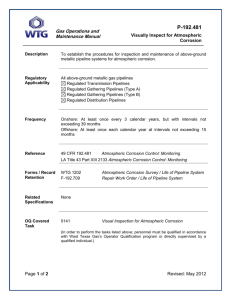Ben- Gurion University of the Negev Materials Engineering Name of
advertisement
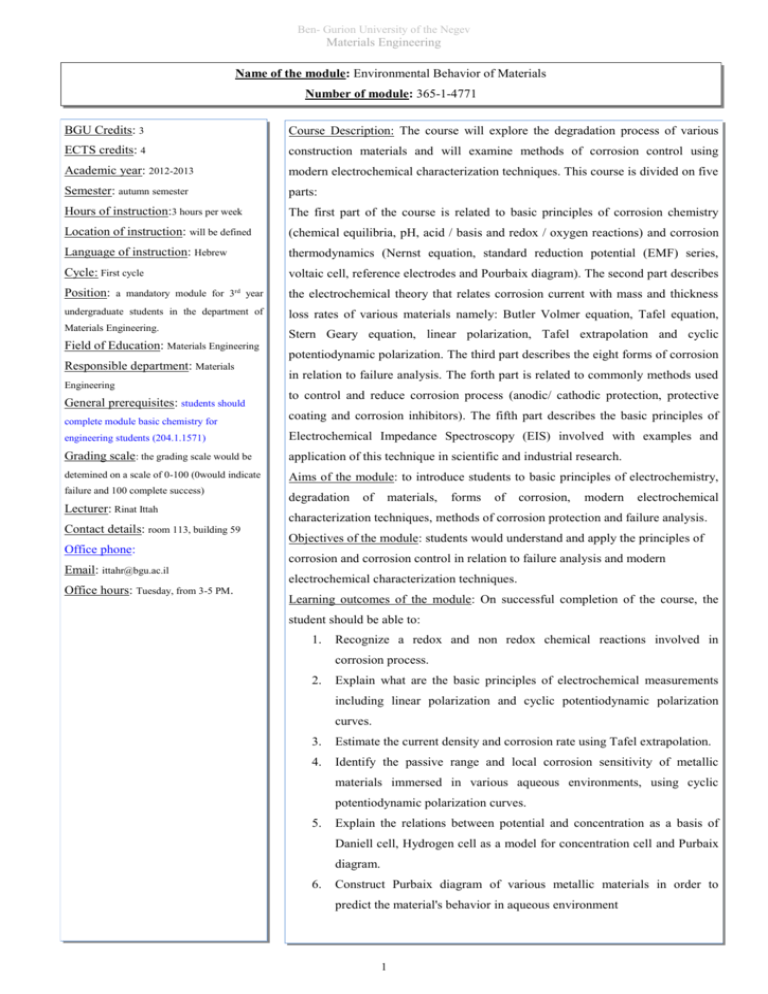
Ben- Gurion University of the Negev Materials Engineering Name of the module: Environmental Behavior of Materials Number of module: 365-1-4771 BGU Credits: 3 Course Description: The course will explore the degradation process of various ECTS credits: 4 construction materials and will examine methods of corrosion control using Academic year: 2012-2013 modern electrochemical characterization techniques. This course is divided on five Semester: autumn semester parts: Hours of instruction:3 hours per week The first part of the course is related to basic principles of corrosion chemistry Location of instruction: will be defined (chemical equilibria, pH, acid / basis and redox / oxygen reactions) and corrosion Language of instruction: Hebrew thermodynamics (Nernst equation, standard reduction potential (EMF) series, Cycle: First cycle voltaic cell, reference electrodes and Pourbaix diagram). The second part describes Position: a mandatory module for 3rd year the electrochemical theory that relates corrosion current with mass and thickness undergraduate students in the department of loss rates of various materials namely: Butler Volmer equation, Tafel equation, Materials Engineering. Field of Education: Materials Engineering Responsible department: Materials Stern Geary equation, linear polarization, Tafel extrapolation and cyclic potentiodynamic polarization. The third part describes the eight forms of corrosion in relation to failure analysis. The forth part is related to commonly methods used Engineering General prerequisites: students should complete module basic chemistry for to control and reduce corrosion process (anodic/ cathodic protection, protective coating and corrosion inhibitors). The fifth part describes the basic principles of engineering students (204.1.1571) Electrochemical Impedance Spectroscopy (EIS) involved with examples and Grading scale: the grading scale would be application of this technique in scientific and industrial research. detemined on a scale of 0-100 (0would indicate Aims of the module: to introduce students to basic principles of electrochemistry, failure and 100 complete success) Lecturer: Rinat Ittah Contact details: room 113, building 59 Office phone: Email: ittahr@bgu.ac.il Office hours: Tuesday, from 3-5 PM. degradation of materials, forms of corrosion, modern electrochemical characterization techniques, methods of corrosion protection and failure analysis. Objectives of the module: students would understand and apply the principles of corrosion and corrosion control in relation to failure analysis and modern electrochemical characterization techniques. Learning outcomes of the module: On successful completion of the course, the student should be able to: 1. Recognize a redox and non redox chemical reactions involved in corrosion process. 2. Explain what are the basic principles of electrochemical measurements including linear polarization and cyclic potentiodynamic polarization curves. 3. Estimate the current density and corrosion rate using Tafel extrapolation. 4. Identify the passive range and local corrosion sensitivity of metallic materials immersed in various aqueous environments, using cyclic potentiodynamic polarization curves. 5. Explain the relations between potential and concentration as a basis of Daniell cell, Hydrogen cell as a model for concentration cell and Purbaix diagram. 6. Construct Purbaix diagram of various metallic materials in order to predict the material's behavior in aqueous environment 1. Construct Purbaix diagram of various metallic materials in order to 1 material's behavior in aqueous environment predict the Ben- Gurion University of the Negev Materials Engineering Module evaluation: at the end of the semester the students will evaluate 7. Identify the eight forms of corrosion in relation to failure analysis. the 8. Predict the effect of temperature and dissolved oxygen concentration on module, in order to draw corrosion rate. conclusions, and for the university's 9. internal needs. Compare and contrast the different between commonly methods of corrosion control. Confirmation: the syllabus was 10. Explain the degradation and the sensitivity of polymers in the chemical industry. confirmed by the faculty academic advisory committee to be valid on 11. Explain the basic principles of EIS and will analyse Bode and Nyquist diagrams for various application in corrosion area. 2012-2013. Attendance regulation: regulation and expectations regarding students' attendance and participation Last update: 1985 in class Teaching arrangement and method of instruction: The module consists of lectures which include example and exercises in class. Assessment: 1. Exam 80% 2. Presentation 20% 100% Work and assignments: student will conduct presentation of 15 min in relation to failure analysis, starting from the sixth lecture. Exam: at the end of semester, open questions. Time required for individual work: in addition to attendance in class, the students are expected to do their assignment and individual work: at least two hours per week and 24 hours before exam. Module Content\ schedule and outlines: Lectures: Chemistry of corrosion 3h Corrosion electrochemistry 3h Corrosion thermodynamic 5h Recognizing corrosion in its forms 3h Failure analysis 5h Principles of corrosion kinetics 6h Corrosion control 3h Degradation of polymers in chemical industry 2h Electrochemical impedance spectroscopy (EIS) 6h 2 Ben- Gurion University of the Negev Materials Engineering Required reading: 1. Fontana M.G. 1986. Corrosion Engineering. 3 nd edn. MCGrow-Hill International. 2. Handbook, ASM Metals. 1987. Vol 13, corrosion Additional literature: Evgenij Barsoukov and J.Ross Macdonald.2005. Impedance Spectroscopy. Wiley Interscience, New Jersey. * All learning material will be available to the students on the module's website (high-learn)/ library/ electronic documents available to BGU students. 3 Ben- Gurion University of the Negev Materials Engineering 4 Ben- Gurion University of the Negev Materials Engineering 5 Ben- Gurion University of the Negev Materials Engineering 6 Ben- Gurion University of the Negev Materials Engineering 7 Ben- Gurion University of the Negev Materials Engineering 8
